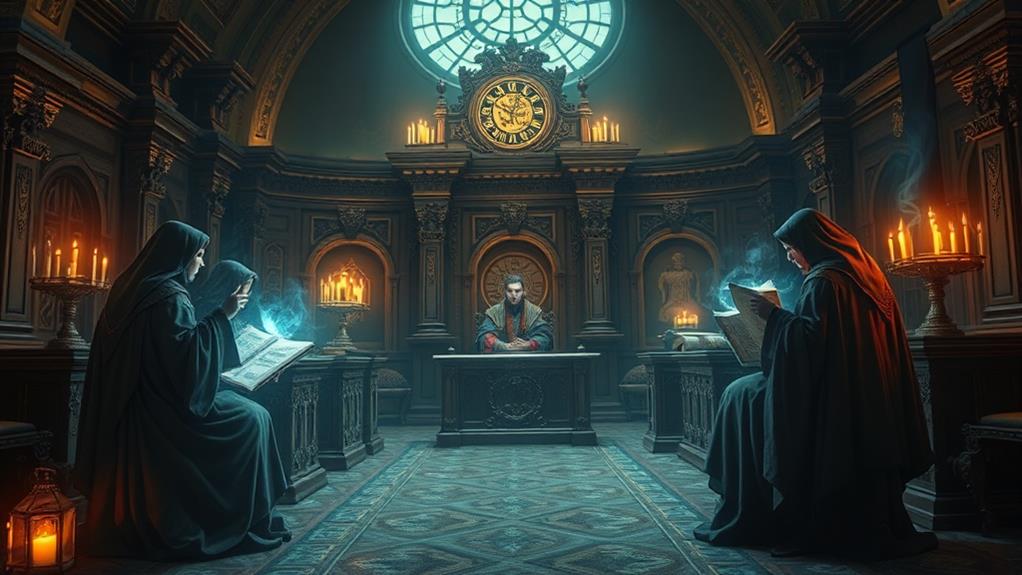
In fantasy worlds, magical legal frameworks are sets of laws and guidelines that govern the use of magic to maintain order and balance. These rules cover aspects like spell regulation, the licensing of magical practitioners, and the prohibition of dark magic. Enforcement is typically carried out by a magical council or court, with penalties ranging from fines to banishment. These frameworks prevent chaos, ensuring that magic is practiced ethically and safely. You'll discover how these laws shape magical societies and influence everything from daily life to grand political schemes as you explore further.
Defining Magical Legal Frameworks
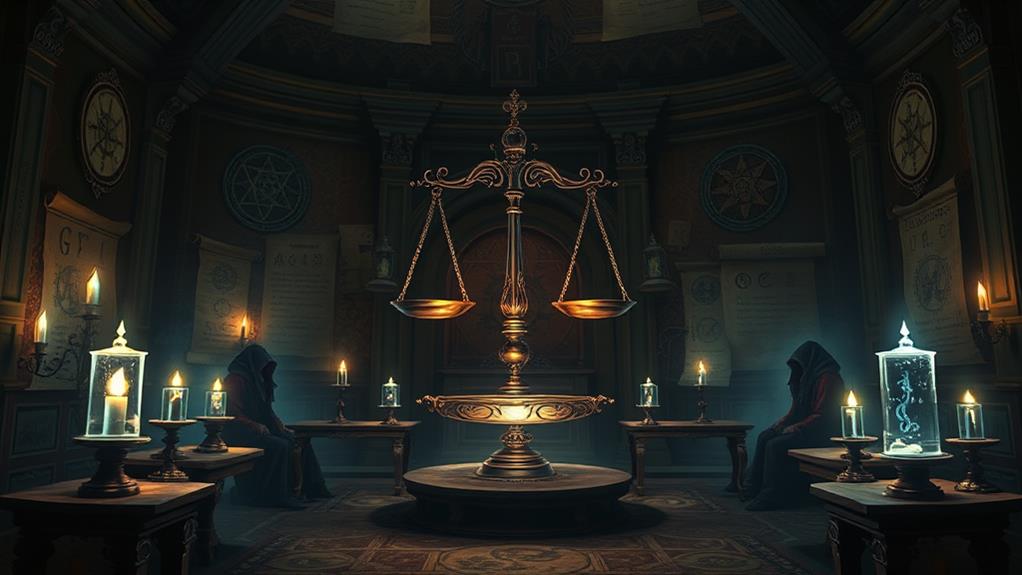
When diving into the concept of magical legal frameworks, it's crucial to understand what they actually encompass. These frameworks are the set of laws, regulations, and guidelines that govern the use and practice of magic within a fantastical world. Picture it as the legal backbone ensuring that magical activities are conducted safely, ethically, and within certain boundaries.
In many fantasy settings, magical legal frameworks address issues like the regulation of spells, the registration of magical practitioners, and the prohibition of dark or forbidden magic. They might also outline the consequences for breaking these rules, ranging from fines and imprisonment to more severe punishments like banishment or magical binding.
Think about how a governing body, like a council of wizards or a magical court, might oversee the enforcement of these laws. They'd be responsible for updating regulations to adapt to new magical discoveries and societal changes. Additionally, magical legal frameworks often include provisions for resolving disputes between magic users, ensuring a fair process that maintains order and justice.
In essence, these frameworks are integral to maintaining the balance and harmony within a magical society, ensuring that the power of magic is wielded responsibly and for the greater good.
Historical Origins of Magical Laws
Understanding the historical origins of magical laws helps us appreciate how these regulations evolved and why they hold such significance today. You need to ponder that early magical societies often faced chaos without established rules. For instance, ancient wizards and sorcerers realized that unregulated magic could lead to catastrophic consequences, such as uncontrolled spells causing widespread destruction or power struggles destabilizing entire communities.
To prevent these issues, early magical councils or covens began drafting rudimentary laws. These primitive regulations typically focused on prohibiting harmful spells and ensuring magical secrecy to protect non-magical populations. As time progressed, these laws became more detailed, often documented in ancient grimoires or magical codices. You can see traces of these early laws in many fantasy worlds, where historical texts are revered and studied by modern practitioners.
Moreover, historical events like magical wars or the rise of dark wizards influenced the development of stricter and more thorough legal frameworks. These events underscored the need for robust laws, leading to the formation of governing bodies like magical ministries or councils. By understanding this historical context, you can better grasp why magical laws are integral to maintaining order and balance in fantasy domains.
Key Components of Wizardry Legislation
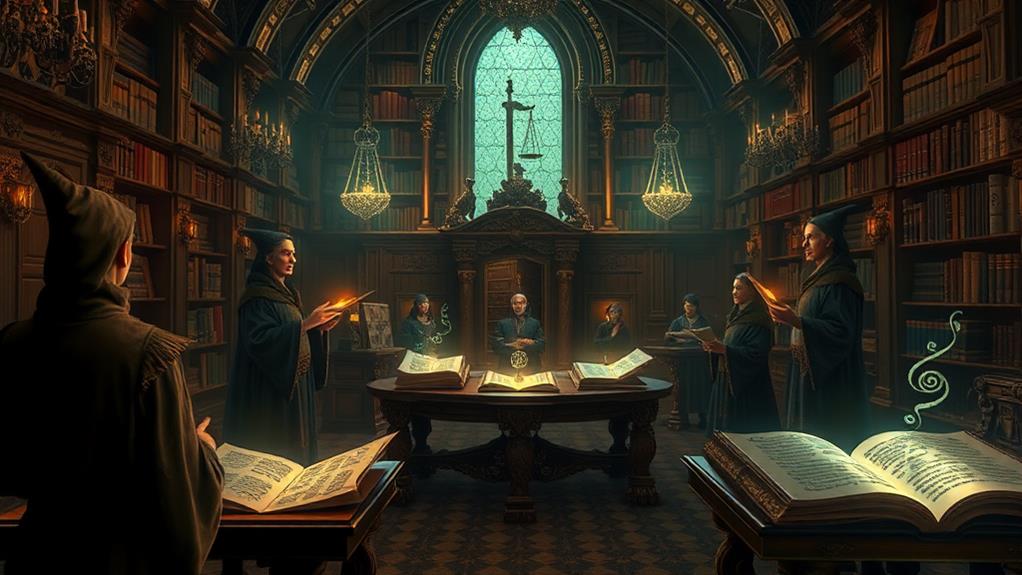
Building upon the historical foundations of magical laws, we can now examine the key components that form the backbone of wizardry legislation today. First, you'll encounter the Classification of Spells. This component categorizes spells by their nature, intent, and potential impact. Whether it's a simple charm or a complex hex, each spell type is clearly defined to prevent misuse.
Next, focus on Magical Licensing. Wizards and witches must obtain proper certification to practice magic. This verifies they've received adequate training and understand the legal ramifications of their actions. Without a license, practicing magic can lead to serious legal consequences.
Another critical element is the Regulation of Magical Creatures. Laws governing the treatment, use, and protection of magical beings are essential. It helps maintain balance and prevents exploitation or harm to these creatures.
Lastly, consider the Ethics in Spellcasting. This component outlines moral guidelines that spellcasters must follow. It addresses issues like consent, the right to privacy, and the responsible use of powerful spells.
These key components guarantee that the practice of magic is safe, ethical, and regulated, providing a structured framework for all magical activities.
Enforcement of Magical Rules
Effectively enforcing magical rules is essential to maintaining order and safety in the wizarding world. To do this, you need a dedicated group of enforcers, often known as magical law enforcement officers. These officers are skilled in both magical and non-magical methods, allowing them to identify and apprehend those who break the rules. They work closely with magical communities, guaranteeing everyone understands and follows the established regulations.
You'll also find magical surveillance systems in place. These can range from enchanted objects that detect unauthorized spells to magical creatures trained to monitor suspicious activities. Such systems act as both a deterrent and a means of quickly catching rule-breakers.
Coordination between different magical jurisdictions is another key element. Wizards and witches often move between domains, and seamless communication between various magical authorities guarantees that offenders can't evade justice by simply crossing a border.
Lastly, education plays a pivotal role. Regular workshops and seminars help keep everyone informed about the latest rules and enforcement techniques. By fostering a culture of compliance and mutual respect, you contribute to a safer, more orderly magical society where everyone thrives.
Penalties for Breaking Magical Laws
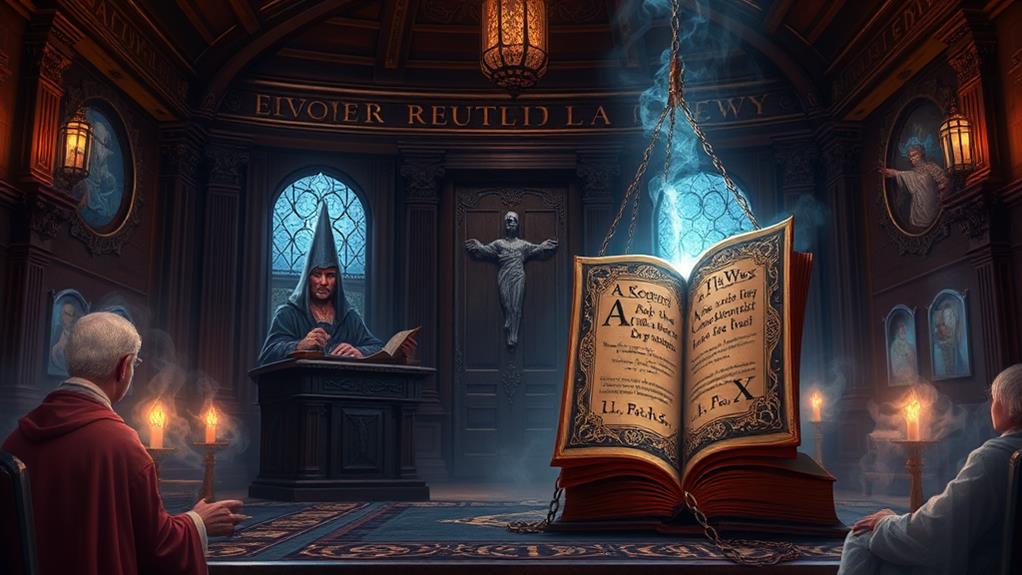
When someone breaks magical laws, the penalties can be severe and varied, depending on the nature and gravity of the offense. You might find that minor infractions, like unauthorized spell casting, incur lighter punishments such as fines or temporary restrictions on magic use. However, more serious breaches, such as using forbidden dark magic or causing harm through magical means, can lead to harsher consequences.
- Fines: Monetary penalties are often used for less severe offenses, serving as both a punishment and a deterrent.
- Magical Restrictions: Authorities may place limitations on your magical abilities, such as binding spells or restricting access to certain magical tools and ingredients.
- Imprisonment: For more egregious violations, you could face imprisonment in a magical facility designed to contain powerful beings and prevent the misuse of magic.
- Exile: In extreme cases, offenders might be banished from magical communities or domains, effectively cutting them off from the sources of their power.
Each penalty is designed to maintain order and prevent further violations, ensuring that the magical world remains balanced and safe for everyone involved.
Influence of Magical Laws on Society
The penalties for breaking magical laws don't just aim to punish offenders; they also shape the very fabric of magical society. When magical laws dictate the permissible use of spells, they guide the ethical framework everyone lives by. You'll find that these laws influence everything from education to politics. For instance, if offensive magic is strictly regulated, educational institutions will prioritize teaching defensive and healing spells, fostering a culture of protection and care.
In everyday life, these laws affect how you interact with others. If mind-reading spells are illegal, trust becomes a cornerstone of relationships. People can converse freely without fear of having their thoughts involuntarily exposed. Additionally, magical laws often dictate societal roles. In societies where teleportation spells are restricted to government officials, those officials wield considerable power and influence.
Economic activities are also shaped by magical regulations. Laws that control the creation of valuable magical artifacts can lead to thriving black markets for illicit goods, impacting local economies. At its core, magical laws create a structured environment where societal norms and behaviors are molded. You can't overlook these laws' profound influence on the society they govern.
Comparing Different Fantasy Legal Systems
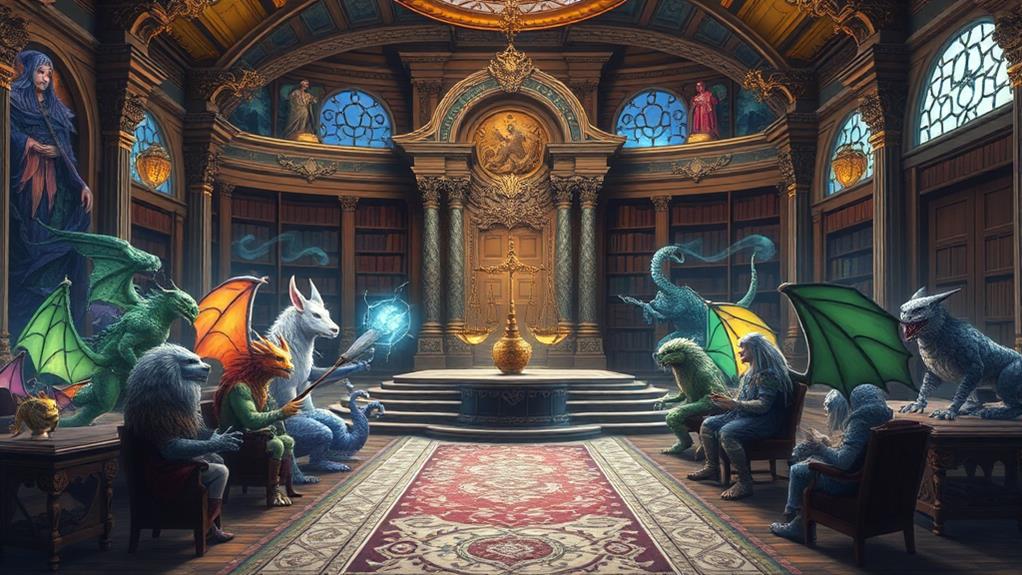
In exploring different fantasy legal systems, you'll notice striking variations that reflect the unique cultures and values of their worlds. For instance, in George R.R. Martin's "A Song of Ice and Fire," the laws are heavily influenced by feudal hierarchies and family allegiances. Contrast this with J.K. Rowling's "Harry Potter" series, where the Ministry of Magic regulates magical activities with complex statutes and bureaucratic oversight.
To understand the differences better, consider these key aspects:
- Authority: Who holds the power to create and enforce laws? In "The Lord of the Rings," it's often monarchs or elders, whereas in "The Wheel of Time," Aes Sedai wield significant legal authority.
- Punishments: What are the consequences for breaking laws? In "Mistborn" by Brandon Sanderson, punishments can be severe and brutal, reflecting a harsh societal structure. Meanwhile, in "Discworld" by Terry Pratchett, punishments are often absurd and satirical.
- Legal Entities: Are there specialized bodies that handle legal matters? "Harry Potter" has the Wizengamot, a magical high court, whereas "The Witcher" series features various guilds and orders.
- Appeals: Is there a process for contesting legal decisions? Some worlds, like "The Chronicles of Narnia," rely on divine judgment, limiting the scope for appeals.
These differences enrich the narratives and shape the characters' interactions with their worlds.
At a Glance
You might think magical legal frameworks are just a fantasy trope, but they actually add depth and realism to fictional worlds. They shape the society, create intriguing conflicts, and make the magical elements feel grounded. By understanding these laws, you appreciate the world-building and character motivations even more. So, next time you plunge into a fantasy novel, pay attention to the magical rules—it's worth it for a richer, more immersive experience.






